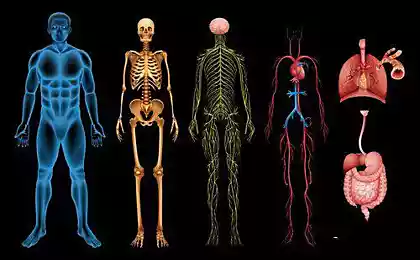234
Kate Harding: How she refused her diet and her body
Obese patients are often persuaded that losing weight is a good way to overcome depression, save a failing marriage, or increase the chances of a successful career. The dream of slimness is the solution to all problems.
The hopes placed on losing weight are so irrational that following a diet can be considered almost superstitious behavior.
“We move from childhood to adolescence, leave home, get married, find a new job, have children, struggle with family problems, get used to a new life when our children leave home, get old — all these life situations can be a hidden reason to go on a diet. There are cases where anxiety about being overweight hides even more serious problems. – Wooley and Garner, quote from the article “Treating Obesity: The High Cost of False Hope”.

When you truly believe that fullness can be accepted (and not just think it sounds great for others, but you still need to lose weight to the point where you look acceptable too), you may find it hard to remember your opinion of it all. Just as it's hard to imagine what it's like to accept your fullness before it actually happens.
On several occasions, I wrote about how long I had lived in a phase of cognitive dissonance: on the one hand, I found it logical that the hype surrounding the “obesity crisis” was unnecessarily overblown and diets were not working. And on the other hand, I still wanted to lose the extra pounds, lose weight to 50 size, and only then I can begin to accept my fullness. The fact is that now I remember it almost only on the mental level and do not remember my feelings: how I felt when I believed two contradictory statements at the same time.
But all of a sudden I thought about the inner protest that comes when someone says diets don't work. This is a protest of full people, which means: "Do not dare deprive me of hope!"
Those who oppose diets are often accused of demoralizing the fat, cruelty and pessimism. I’ve never been able to understand these accusations: we’re trying to make it clear that you can love your full body instead of hating it, and that you can take concrete steps that will help significantly improve your health without declaring a war on weight.
In my opinion, there is enough compassion and optimism in this message, not to mention that it is realistic. But there will always be people who interpret my thought as, “I, Kate Harding, personally condemn you to lifelong fullness!” Don't even try, fatie! You're doomed! Muahaha!
And then I started thinking about what it was like before I really made peace with my body. And here's what it's like: The dream of Slenderness ran through my whole life, even when one day I lost a lot of weight and still remained as depressed, unassembled and nervous as before (and then again filled, because, as you know, diets do not work). At that time, the realization that I was thin now simply did not fit into my head, because the Dream of Slenderness was much more familiar and understandable. I put on this dream many, many years, and thin passed only a couple of years. Reality had no chance.
We talked a lot about the fact that being full shouldn’t stop you from doing what you want to do, but we thought that you need to lose weight. Wear a swimsuit and go water skiing. Apply for that fabulous vacancy for which your qualifications are barely enough. Ask an attractive guy out on a date. Enroll in the gym. Wear a luxurious dress. Anything you put off for "someday." Do it, damn it! This is your life, it is happening right now as we speak.
Such warnings do not take into account the magic power of dreams of harmony. You see, the Dream of Slenderness isn’t just about wanting to lose enough weight to look “more acceptable.” This desire to become a completely different person, more courageous, confident and lucky than the old fat version.. It's not just "When I lose weight, I'll look good in a swimsuit" - it's "When I lose weight, I'll be the kind of person who flanks the beach, making men cry."And also:
And so on and so forth. These are examples from my Dream of Slenderness, but I'm sure you'll have yours.
In this light, it’s much easier to understand why some people lose their temper when they’re told, “Yeah, you have zero chance of losing weight forever, so you better take care of your mood and start enjoying life as it is, fat.” For a person who is completely immersed in the Dream of Slenderness, it means not just “Everything says you’ll be full for the rest of your life, but there’s nothing terrible about it,” but “You’ll never be who you want to be!” Everything says that you will never find love, you will not be promoted, you will not make new friends, you will never be confident and open to the new!
If that's what you hear when I say, "Diets don't work," then yes, I get it, it's a total disaster.
Giving up the Dream of Slenderness is perhaps the most difficult step on the road to accepting fullness. Maybe that's why my brain was superseding the memory of that stage: it was too heavy. Because I didn't just have to accept my hip girth, I had to accept who I was, and I stopped expecting to magically become the person I imagined myself to be.
Of course, this is a normal stage of growing up. You begin to realize that this is the end; of course, you continue to try something new, you live a busy life, but some basic context has already developed. There are skills, experience, material components that will almost certainly remain inaccessible to you. Period. But this does not mean that one should give up opportunities and stop dreaming, just as in the parable of the creation of the statue of David. You have to cut off everything that you are not. However, for a full person this can be especially difficult, because from every corner rushes that inside the full person “lives thin, waiting to get out” and this thin is much cooler.
In reality, I will never be a person who would love to live in a tent somewhere in Tibet, because please, I have a hotel in London with all the facilities.
Most likely, I will never learn to stand normally on water skis (I can not even stand up for normal skis) and will not do a backflip. Sometimes I can be sociable and charming, but I will always need time to recharge with my dogs and a good book; my life will not be full of social events, it would exhaust me.
(Although I’ve learned to hide it, in unfamiliar situations I’ll always be terribly shy.) In my lifetime, I can learn to speak one foreign language fluently, but certainly not five.
I will never publish a novel until I write it. I will always have to bear in mind my natural tendency to depression and maybe my whole life on medication. My attitude toward money will never allow me to leave town life, buy a farm and raise sheep, or change jobs and raft along the river as a guide. My chances of marrying George Clooney are slim.
And this is not because of completeness, but because I am myself.
When I was living the Dream of Slenderness, it seemed to me that if I lost weight, this small and simple (ha!) circumstance would release a completely new personality – a delightful, free, strong spirit, for whom “everything should be tried in life”, which would attract interesting people and events. This hope, of course, has a downside:
I used it as an excuse for inaction. After all, if all this is not the real me, then why even try? If I still don't find a suitable husband until I lose weight, why go on dates? If I can't finish a novel until I lose weight, why write? If I'm not the soul of the company until I lose weight, why make new friends? If I don’t want to go to the mountains until I lose weight, why travel?
And so on and so forth.
Accepting fullness was not the most difficult. The hardest part was accepting my identity and all the limitations that had nothing to do with hip girth. Ironically, once I was able to do that, my life was a million times better. I met the right man, started doing yoga, became more serious about writing a novel, stopped making excuses for vacationing in the United States and Canada, rather than in some more exotic places, etc. And suddenly (oh, miracle!) life became much more interesting. The "slim me" that had previously been hiding inside, got out, just turned out to be really full. She is quite attractive, moderately sociable, without prejudice, with a vivid imagination, while she likes a measured life in a familiar environment and the opportunity to be alone.
I never expected to be like that, I was like that.

I gave up dieting and adopted my body. And that meant not just accepting that I would never lose weight. It meant accepting that I would never be the million different people I could be.. (It is said that this phenomenon is called "maturity"? I’m definitely not going to stop in my aspirations, but I’m completely in favor of realizing and forgiving myself. There is a big difference between “I can’t be different” and “I don’t have to be different.” Most likely, you will not be able to lose weight forever if you are not initially thin, but otherwise you can do whatever you want. Theoretically, you can be anything.
The question is who exactly do you want to become and what do you intend to do about it. The dream of Slenderness is a convenient reason not to ask these questions for real, and this is the danger. Not only does it prevent you from being who you are, it also prevents you from becoming what you could be if you started working with what you have. But the person who hides inside may well be much cooler than you are today. He's just not skinny. published
Credit: Kate Harding (Kate Harding)
Translated by Marina Nestrugina
P.S. And remember, just changing our consumption – together we change the world!
Source: intueat.ru/journal/mechta-o-strojnosti/
The hopes placed on losing weight are so irrational that following a diet can be considered almost superstitious behavior.
“We move from childhood to adolescence, leave home, get married, find a new job, have children, struggle with family problems, get used to a new life when our children leave home, get old — all these life situations can be a hidden reason to go on a diet. There are cases where anxiety about being overweight hides even more serious problems. – Wooley and Garner, quote from the article “Treating Obesity: The High Cost of False Hope”.

When you truly believe that fullness can be accepted (and not just think it sounds great for others, but you still need to lose weight to the point where you look acceptable too), you may find it hard to remember your opinion of it all. Just as it's hard to imagine what it's like to accept your fullness before it actually happens.
On several occasions, I wrote about how long I had lived in a phase of cognitive dissonance: on the one hand, I found it logical that the hype surrounding the “obesity crisis” was unnecessarily overblown and diets were not working. And on the other hand, I still wanted to lose the extra pounds, lose weight to 50 size, and only then I can begin to accept my fullness. The fact is that now I remember it almost only on the mental level and do not remember my feelings: how I felt when I believed two contradictory statements at the same time.
But all of a sudden I thought about the inner protest that comes when someone says diets don't work. This is a protest of full people, which means: "Do not dare deprive me of hope!"
Those who oppose diets are often accused of demoralizing the fat, cruelty and pessimism. I’ve never been able to understand these accusations: we’re trying to make it clear that you can love your full body instead of hating it, and that you can take concrete steps that will help significantly improve your health without declaring a war on weight.
In my opinion, there is enough compassion and optimism in this message, not to mention that it is realistic. But there will always be people who interpret my thought as, “I, Kate Harding, personally condemn you to lifelong fullness!” Don't even try, fatie! You're doomed! Muahaha!
And then I started thinking about what it was like before I really made peace with my body. And here's what it's like: The dream of Slenderness ran through my whole life, even when one day I lost a lot of weight and still remained as depressed, unassembled and nervous as before (and then again filled, because, as you know, diets do not work). At that time, the realization that I was thin now simply did not fit into my head, because the Dream of Slenderness was much more familiar and understandable. I put on this dream many, many years, and thin passed only a couple of years. Reality had no chance.
We talked a lot about the fact that being full shouldn’t stop you from doing what you want to do, but we thought that you need to lose weight. Wear a swimsuit and go water skiing. Apply for that fabulous vacancy for which your qualifications are barely enough. Ask an attractive guy out on a date. Enroll in the gym. Wear a luxurious dress. Anything you put off for "someday." Do it, damn it! This is your life, it is happening right now as we speak.
Such warnings do not take into account the magic power of dreams of harmony. You see, the Dream of Slenderness isn’t just about wanting to lose enough weight to look “more acceptable.” This desire to become a completely different person, more courageous, confident and lucky than the old fat version.. It's not just "When I lose weight, I'll look good in a swimsuit" - it's "When I lose weight, I'll be the kind of person who flanks the beach, making men cry."And also:
- When I lose weight, it will be easy for me to find a partner / revive the relationship with my husband.
- When I lose weight, I'll have the job I've always dreamed of.
- When I lose weight, I'll stop moping.
- When I lose weight, I will become a brave traveler and will stop being afraid of countries whose language I do not know and/or which may not have sewers.
- When I lose weight, I will spend a lot of time away from home.
- When I lose weight, I will become more sociable and charming, and then I will have a bunch of friends.
And so on and so forth. These are examples from my Dream of Slenderness, but I'm sure you'll have yours.
In this light, it’s much easier to understand why some people lose their temper when they’re told, “Yeah, you have zero chance of losing weight forever, so you better take care of your mood and start enjoying life as it is, fat.” For a person who is completely immersed in the Dream of Slenderness, it means not just “Everything says you’ll be full for the rest of your life, but there’s nothing terrible about it,” but “You’ll never be who you want to be!” Everything says that you will never find love, you will not be promoted, you will not make new friends, you will never be confident and open to the new!
If that's what you hear when I say, "Diets don't work," then yes, I get it, it's a total disaster.
Giving up the Dream of Slenderness is perhaps the most difficult step on the road to accepting fullness. Maybe that's why my brain was superseding the memory of that stage: it was too heavy. Because I didn't just have to accept my hip girth, I had to accept who I was, and I stopped expecting to magically become the person I imagined myself to be.
Of course, this is a normal stage of growing up. You begin to realize that this is the end; of course, you continue to try something new, you live a busy life, but some basic context has already developed. There are skills, experience, material components that will almost certainly remain inaccessible to you. Period. But this does not mean that one should give up opportunities and stop dreaming, just as in the parable of the creation of the statue of David. You have to cut off everything that you are not. However, for a full person this can be especially difficult, because from every corner rushes that inside the full person “lives thin, waiting to get out” and this thin is much cooler.
In reality, I will never be a person who would love to live in a tent somewhere in Tibet, because please, I have a hotel in London with all the facilities.
Most likely, I will never learn to stand normally on water skis (I can not even stand up for normal skis) and will not do a backflip. Sometimes I can be sociable and charming, but I will always need time to recharge with my dogs and a good book; my life will not be full of social events, it would exhaust me.
(Although I’ve learned to hide it, in unfamiliar situations I’ll always be terribly shy.) In my lifetime, I can learn to speak one foreign language fluently, but certainly not five.
I will never publish a novel until I write it. I will always have to bear in mind my natural tendency to depression and maybe my whole life on medication. My attitude toward money will never allow me to leave town life, buy a farm and raise sheep, or change jobs and raft along the river as a guide. My chances of marrying George Clooney are slim.
And this is not because of completeness, but because I am myself.
When I was living the Dream of Slenderness, it seemed to me that if I lost weight, this small and simple (ha!) circumstance would release a completely new personality – a delightful, free, strong spirit, for whom “everything should be tried in life”, which would attract interesting people and events. This hope, of course, has a downside:
I used it as an excuse for inaction. After all, if all this is not the real me, then why even try? If I still don't find a suitable husband until I lose weight, why go on dates? If I can't finish a novel until I lose weight, why write? If I'm not the soul of the company until I lose weight, why make new friends? If I don’t want to go to the mountains until I lose weight, why travel?
And so on and so forth.
Accepting fullness was not the most difficult. The hardest part was accepting my identity and all the limitations that had nothing to do with hip girth. Ironically, once I was able to do that, my life was a million times better. I met the right man, started doing yoga, became more serious about writing a novel, stopped making excuses for vacationing in the United States and Canada, rather than in some more exotic places, etc. And suddenly (oh, miracle!) life became much more interesting. The "slim me" that had previously been hiding inside, got out, just turned out to be really full. She is quite attractive, moderately sociable, without prejudice, with a vivid imagination, while she likes a measured life in a familiar environment and the opportunity to be alone.
I never expected to be like that, I was like that.

I gave up dieting and adopted my body. And that meant not just accepting that I would never lose weight. It meant accepting that I would never be the million different people I could be.. (It is said that this phenomenon is called "maturity"? I’m definitely not going to stop in my aspirations, but I’m completely in favor of realizing and forgiving myself. There is a big difference between “I can’t be different” and “I don’t have to be different.” Most likely, you will not be able to lose weight forever if you are not initially thin, but otherwise you can do whatever you want. Theoretically, you can be anything.
The question is who exactly do you want to become and what do you intend to do about it. The dream of Slenderness is a convenient reason not to ask these questions for real, and this is the danger. Not only does it prevent you from being who you are, it also prevents you from becoming what you could be if you started working with what you have. But the person who hides inside may well be much cooler than you are today. He's just not skinny. published
Credit: Kate Harding (Kate Harding)
Translated by Marina Nestrugina
P.S. And remember, just changing our consumption – together we change the world!
Source: intueat.ru/journal/mechta-o-strojnosti/























